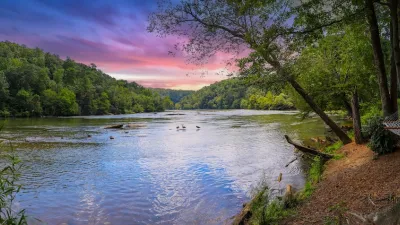Renee Lewis Glover, president and CEO of the Atlanta Housing Authority, reflects on the troubled history of housing projects in Atlanta, GA, as the last of its kind in the city is demolished.
"Atlanta has risen from its own ashes many times - most spectacularly after the Civil War. But there have been other occasions when the will of the people to do the right thing has fostered civic rebirth. While many Southern cities were mired in racial unrest and race riots, for example, Atlanta said, "We can do better," and we did.
Another example: During the Great Depression, one third of the nation was ill-housed. In Atlanta, the tenements were atrocious and the shortage of housing was critical. When the federal government authorized public housing construction during the mid-1930s, Atlanta's spirit of resurgence led the way. We built the first major public housing project, on 60 acres of blighted land near Georgia Tech that eventually became Techwood/Clark Howell Homes. Over time, Atlanta had more public housing units per capita than any other American city, and for many years these projects were transitional housing for the working poor, who were striving to achieve self-sufficiency and the American dream."
"As Atlanta was preparing to host the 1996 Centennial Olympic Games, the Atlanta Housing Authority was ranked as one of the worst large public housing authorities in the entire country. Nearly all the schools serving students living in AHA properties were ranked among the worst in the entire state.
Just 12 years later, those dismal statistics have dramatically improved. AHA is now the national model for creating healthy mixed-use, mixed-income communities. More importantly, recipients are entering and succeeding in the work force and are on their way to achieving their version of the American Dream."
FULL STORY: New public housing at heart of a civic rebirth

Planetizen Federal Action Tracker
A weekly monitor of how Trump’s orders and actions are impacting planners and planning in America.

Restaurant Patios Were a Pandemic Win — Why Were They so Hard to Keep?
Social distancing requirements and changes in travel patterns prompted cities to pilot new uses for street and sidewalk space. Then it got complicated.

Map: Where Senate Republicans Want to Sell Your Public Lands
For public land advocates, the Senate Republicans’ proposal to sell millions of acres of public land in the West is “the biggest fight of their careers.”

Orange County, Florida Adopts Largest US “Sprawl Repair” Code
The ‘Orange Code’ seeks to rectify decades of sprawl-inducing, car-oriented development.

Maui's Vacation Rental Debate Turns Ugly
Verbal attacks, misinformation campaigns and fistfights plague a high-stakes debate to convert thousands of vacation rentals into long-term housing.

San Francisco Suspends Traffic Calming Amidst Record Deaths
Citing “a challenging fiscal landscape,” the city will cease the program on the heels of 42 traffic deaths, including 24 pedestrians.
Urban Design for Planners 1: Software Tools
This six-course series explores essential urban design concepts using open source software and equips planners with the tools they need to participate fully in the urban design process.
Planning for Universal Design
Learn the tools for implementing Universal Design in planning regulations.
Heyer Gruel & Associates PA
JM Goldson LLC
Custer County Colorado
City of Camden Redevelopment Agency
City of Astoria
Transportation Research & Education Center (TREC) at Portland State University
Camden Redevelopment Agency
City of Claremont
Municipality of Princeton (NJ)





























